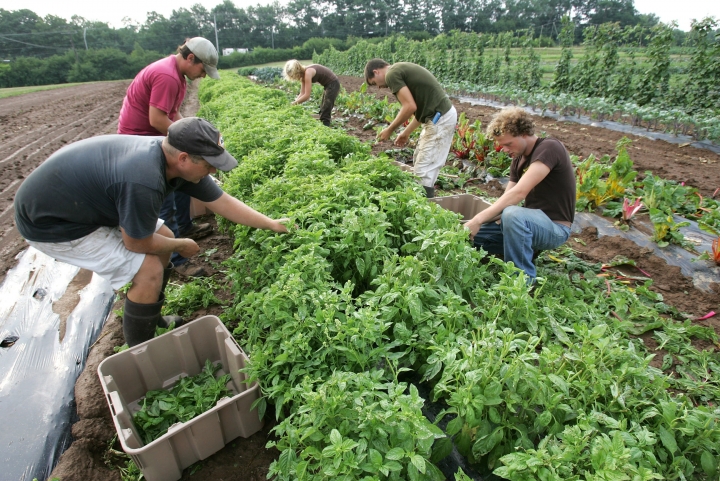KEY QUESTIONS
• Who?
• What?
• Where?
• When?
• How?
Today, we’re about the “why.” We’ll start with a quote about reason, from JP Morgan, the famous American banker and financier: “A man always has two reasons for doing anything: a good reason and the real reason.”
Ask people why they want to farm, and you’re likely to hear something like, “We want to provide healthy food to our community.” A “good reason.” But, maybe the “real reason” is they just don’t like people and don’t like to be told what to do. I can relate to that. Unfortunately, when you farm, you might trade one boss for 50… also known as “customers.” So, soon the real reason gets destroyed.
Knowing that, would the idea of producing food for the community still keep you fully committed?
We often do stuff because it sounds neat, somebody else made gazillions doing it (or claimed they did on TikTok), or we do the thing that makes us look chill. We desperately want to be one of the cool kids, even though some of us aged out of being teenagers decades ago.
English author Simon Sinek insists we must “Start with WHY,” and so we will.
Start with the “Why?”
Choosing to farm may have many reasons. I’ve heard hundreds of dreamy visions of starting a food forest, a permaculture garden, a petting zoo of miniature pigs and—my personal favorite—creating an educational, agrarian space to teach the city folk where their food comes from, all the while actually demonstrating practices that are unrelated to how 99.99% of food is grown.
Some people say farming is aspirational. But, many would-be farmers will also be aspiring to be making more (some) money soon into their journey of educating and changing the world.
Learn Before You Teach

I’ve heard so many farmers with a couple of years under their belt pretending they could teach a masters-level class. They ask me if I need them to teach a segment for my “Small Farm Startup School.” But, they don’t know what they are talking about. They don’t know what they don’t know. (My ex-wife desperately wants to enter the chat. Remember her from the first post? She was onboard until she got bored.)
Many people, not just farmers, claim they have years of experience. However, what they have is years of replicating one year of experience. Doing it one way over and over doesn’t mean it’s the best way, or that it is resilient and works when the soil, weather, climate, management practices or budget changes. Really learn before you try to teach, and you must absolutely know “why” you farm before you try to convert others.
Testing Your “Why”
Here is a question for you to answer: Would you still farm if you couldn’t tell anyone about it?
A recent YouTube parody told the story about a marathon runner who didn’t tell anyone she ran. People were dumbfounded that she committed to the hard work, pain, and mental anguish of training for and running a marathon but didn’t tell anyone. Think about it. Could you do it? Could you farm without telling anyone? Are you doing it for the right reasons? I admit my identity was tied to my farm. When people asked about the goats, I got a jolt of dopamine. I talked till their ears dripped blood.
First, you need to establish a baseline. What do you think farming is? What is your perception of what you will be doing?
![Babydoll sheep. [credit: Babydoll Sheep Australia]](https://www.babydollsheepaustralia.com/uploads/1/2/5/6/125664758/241188327-2453190671492455-5169960930804720224-n_orig.jpg)
The babydoll sheep start out as cute little buggers, but taking care of them degenerates to work quickly when they sneak out often because you can’t afford to replace the rickety fence. You didn’t think (or, didn’t want to think) about that before, though. You couldn’t wait. You had to get the animals. People were dying to hear about them. Or, so you thought.
“Why” and “Who” Must Be Connected
Simek states that you must master the “why” in order to get the “who” on your side. It’s about communication. The why must motivate the who to fix fences on the weekend, feed the broilers before school, put up with the old hay baler when the knotter mechanism breaks on the only clear day in the next week. The salty language will fly. Do all of the “who’s” on this journey agree so much with the “why’s” that they can tolerate the breakdowns?
There’s a bumper sticker that says, “Sorry for what I said when working cattle.” Emotions will break. Will relationships also break? Does the why smooth over the upset?
Some additional “whys” I’ve heard:
- Feed my family.
- Teach my kids responsibility.
- Provide healthy food to my community.
- Teach others where their food comes from.
- Heal the land.
- Make some money as a side hustle or maybe farming can become our primary income.
I could challenge each of these assumptions, but I’d be accused of being a curmudgeon. I am. But…
Just make sure the reason (the “why”) you often give and share with others—maybe too often—is a reason that is grounded, endures, and is fully embraced by every single “who” that is needed to make it last.
Go back and revisit the who as you define the why.
As Wendell Berry famously said, “Farming is a way of life, not a way to make a living.” Your reason to farm should not just sustain you financially but also spiritually, mentally, and emotionally.
In our next installment, we will discuss the “what,” as in: “What, exactly, are you going to grow?” and how does it fit with the “who” and the “why.”
 4
4
